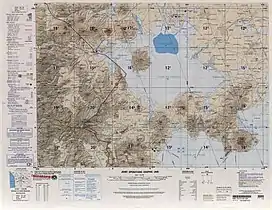Paryani
Paryani (Quechua parya reddish; copper; sparrow, Aymara -ni a suffix,[2][3][4][5] hispanicized spelling Pariani) is a 5,077-metre-high (16,657 ft) volcano[6] in the Andes of Bolivia. It is located in the Oruro Department, Sabaya Province, Sabaya Municipality. The cone of Paryani lies at the Salar de Coipasa, south of Pumiri and east of Tata Sabaya.[7]

Map showing the cone of Paryani north of Salar de Coipasa
| Paryani | |
|---|---|
 The cones of Paryani (in the lower right part of this image) and Pumiri (above it, on the right) as seen from space (NASA) (north is to the upper right) | |
| Highest point | |
| Elevation | 5,077 m (16,657 ft)[1] |
| Coordinates | 19°07′52″S 68°25′30″W |
| Geography | |
 Paryani | |
| Parent range | Andes |
References
- Bolivian IGM map 1:50,000 Sabaya 5936-IV
- César W. Astuhuamán Gonzáles, Pariacaca: un oráculo imperial andino: "Respecto al significado del nombre de la deidad, los términos Paria (rojiza) y caca (montaña), aluden a una montaña rojiza, ... ."
- Rodolfo Cerrón-Palomino, Pontificia Universidad Católica del Perú, Sufijos arcaicos quechuas en la toponimia andina, Etimologias, Lexis XXVI. 2 (2002): 559-577
- Teofilo Laime Ajacopa (2007). Diccionario Bilingüe: Iskay simipi yuyayk’anch: Quechua – Castellano / Castellano – Quechua (PDF). La Paz, Bolivia.
{{cite book}}: CS1 maint: location missing publisher (link) - Radio San Gabriel, "Instituto Radiofonico de Promoción Aymara" (IRPA) 1993, Republicado por Instituto de las Lenguas y Literaturas Andinas-Amazónicas (ILLLA-A) 2011, Transcripción del Vocabulario de la Lengua Aymara, P. Ludovico Bertonio 1612 (Spanish-Aymara-Aymara-Spanish dictionary)
- Ed. by Russell S. Harmon,Carlos W. Rapela, Andean Magmatism and Its Tectonic Setting, Centro de Investigaciónes Geológicas, Universidad Nacional de La Plata, Argentina, 1991
- "Sabaya". Archived from the original on August 13, 2014. Retrieved January 15, 2016.
This article is issued from Wikipedia. The text is licensed under Creative Commons - Attribution - Sharealike. Additional terms may apply for the media files.
